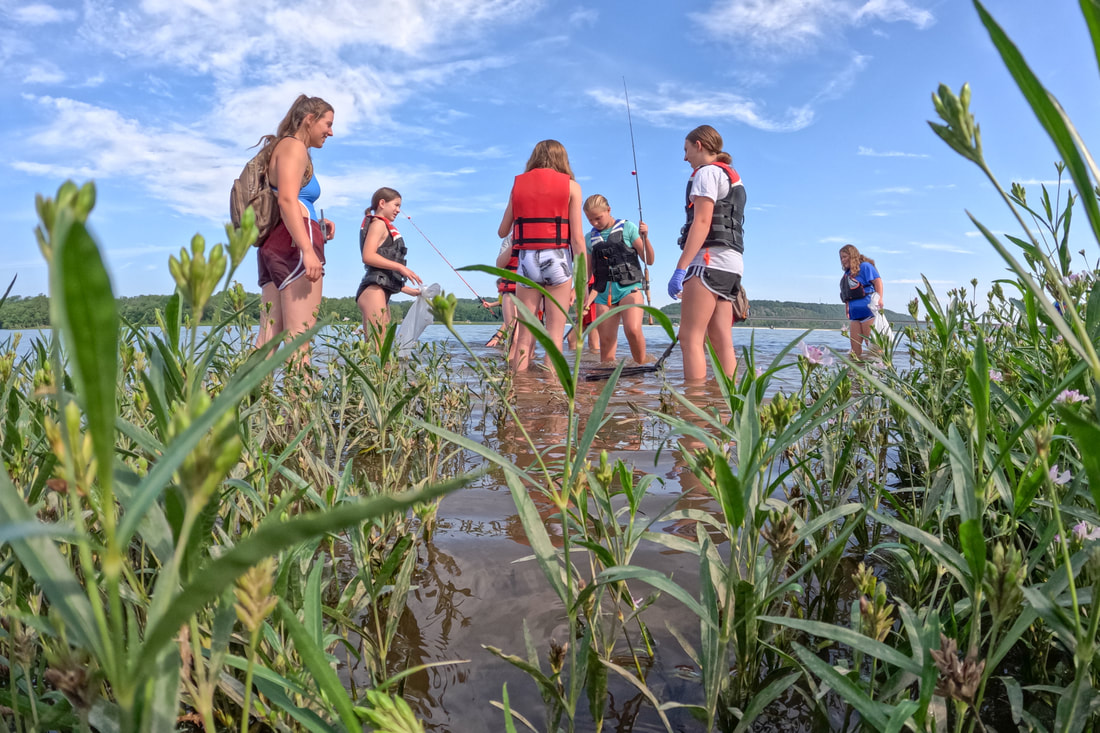OTTERS (Observational Tours To Explore River Systems) Riverwalks are designed for middle and/or high school students as an immersive experience to see the river in a new way, searching for various species of all kinds and how they are interconnected with each other in the greater aquatic ecosystem.
"This is basically a guided riverside adventure where we equip kids with various tools to see the river on a whole new hands-on level," said Riverkeeper John Zaktansky. "We break them up into smaller teams and give each team an exploration bag with various tools and equipment and then encourage them to get wet and muddy and creatively explore the various elements of the river."
Each exploration bag includes an underwater camera for photos and video, net, laminated ID sheets for various common aquatic species, ice cube tray for sorting and viewing smaller creatures, binoculars, notepad and pencils for taking notes, magnet fishing kit, trash bags and gloves for picking up litter, plastic forceps for smaller specimens, magnifying glass and more. Each group also gets a fishing pole with hook, sinker and bobber and is encouraged to observe what sort of things they think fish eat along the river's banks and find their own live bait as they go.
"We took the children down to the river to expose them to the outdoors with doing so we were able to catch macroinvertebrates and talk about the importance of our waterways and our environment and how to be a good stewards of the environment," said association board member and program creator Doug Fessler. "They even cleaned up litter along the way and witnessed how important clean water is for creatures of all shapes and sizes, including humans."
Zaktansky agreed.
"You never know what sort of experience a kid will have that sticks with them. Some of these young people may be the next generation of stewards for our river. Some may use the camera and develop a love of outdoor photography and videography. Others may walk away with a fascination with science or want to pursue fishing or some other river-related recreation," said Zaktansky. "Ultimately, for all of them, we hope we at least plant a seed of appreciation for our aquatic ecosystem and a desire to better protect the fragile synergy across each level of it."
"This is basically a guided riverside adventure where we equip kids with various tools to see the river on a whole new hands-on level," said Riverkeeper John Zaktansky. "We break them up into smaller teams and give each team an exploration bag with various tools and equipment and then encourage them to get wet and muddy and creatively explore the various elements of the river."
Each exploration bag includes an underwater camera for photos and video, net, laminated ID sheets for various common aquatic species, ice cube tray for sorting and viewing smaller creatures, binoculars, notepad and pencils for taking notes, magnet fishing kit, trash bags and gloves for picking up litter, plastic forceps for smaller specimens, magnifying glass and more. Each group also gets a fishing pole with hook, sinker and bobber and is encouraged to observe what sort of things they think fish eat along the river's banks and find their own live bait as they go.
"We took the children down to the river to expose them to the outdoors with doing so we were able to catch macroinvertebrates and talk about the importance of our waterways and our environment and how to be a good stewards of the environment," said association board member and program creator Doug Fessler. "They even cleaned up litter along the way and witnessed how important clean water is for creatures of all shapes and sizes, including humans."
Zaktansky agreed.
"You never know what sort of experience a kid will have that sticks with them. Some of these young people may be the next generation of stewards for our river. Some may use the camera and develop a love of outdoor photography and videography. Others may walk away with a fascination with science or want to pursue fishing or some other river-related recreation," said Zaktansky. "Ultimately, for all of them, we hope we at least plant a seed of appreciation for our aquatic ecosystem and a desire to better protect the fragile synergy across each level of it."
